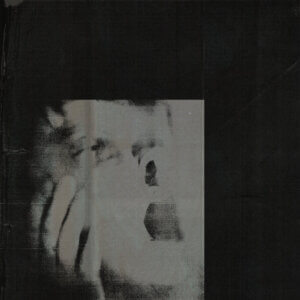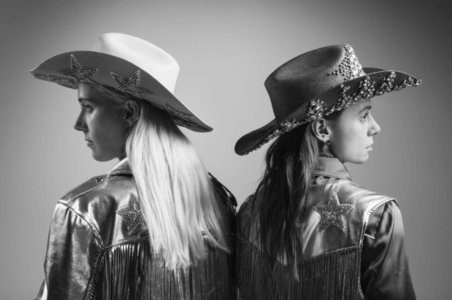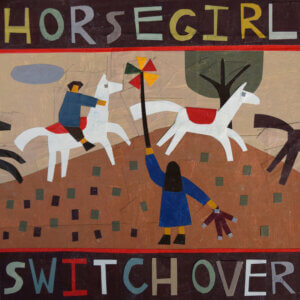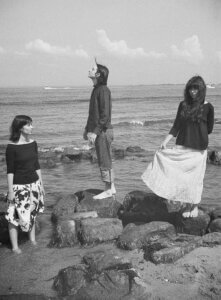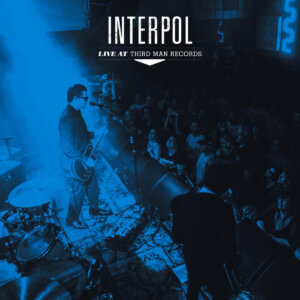Interview With Daniel Kessler From Interpol

When Carlos Dengler, the iconic bassist from Interpol left the band following the completion of their 2010 self-titled, the future of the group was uncertain. While there was no strife between the remaining three members, the time was at hand for a much needed break. Drummer Sam Fogarino started a side project called EmptyMansions while singer Paul Banks made a solo record, an alter-ego EP, and a rap mixtape. Guitarist Daniel Kessler kept it low-key and branched out of music for a bit. Opening a restaurant in Brooklyn, he took things down a notch while the band contemplated their future.
Now without a bassist, Kessler and Banks reconvened in August of 2012 to see if there was still something Interpol had to offer. While their first day with two guitars was unproductive, Paul bringing his bass in on the second would prove to be the gas they needed to get things cooking again. Throughout 2013, they recorded their fifth album and first entirely as a trio. Northern Transmissions up with Kessler to talk about the transition and how the band staved off any doubts with a new-found chemistry as a three-piece.
Northern Transmissions: Can you describe the general feeling you personally had about the group in the wake of the tour supporting the self-titled?
Daniel Kessler: I felt pretty happy about what we did throughout our campaign in general. But yeah, it was just like everything. We felt it was time to take a little bit of a break, and let life take its course. Both Sam and Paul had albums that they wanted to work on, which was awesome. I hadn’t really put too much thought beyond that. I knew we were going to try to do something but we didn’t want to have to force it to happen. You have to be respectful of your process. We were pretty patient and gave each other space, and we finally found some time to get together in August of 2012. Both Paul and I took five days, just the two of us. Basically I wrote quite a bit and by day two, we had a pretty good foundation for two of the songs for the record. I think once we started that process, we found out that we did have a lot of things to say.
NT: Were you personally concerned about the future of the group?
DK: I felt like we owed it to ourselves to get together and see if we had anything left to say. It felt only right to not overly think things and give space as required, and not make too many plans or decisions. I was hopeful that we’d get together and work on stuff, but at the same time, you have to find the right time. And we gave a little space before we started having that conversation. When we did get together, we planted some good seeds and we decided that we are going to work on new material.
NT: Was David Pajo ever considered to be the band’s permanent replacement for Carlos or were you think it would just be the tour?
DK: He was always thought of as just being a touring member, but he only did half the tour. He left for family reasons, so we didn’t have a lot of time to think about it. We hadn’t made a decision on how we were going to write the next record at all. We didn’t even start making that foray until that second day of that writing period in 2012 when Paul and I got together and he said “hey, maybe I should play bass.”
NT: What did you do during the band’s hiatus?
DK: For 2012 I started writing a little bit of the songs that would be part of this record, but before that, I just kind of went back to life. Seeing my friends, sleeping in my own bed. I actually started collaborating on another project with a friend of mine for an album that’s going to be out next year. It’s called Big Noble. It’s all instrumental, very atmospheric. Almost like Music for Films. We recorded everything in my living room very loosely. I was trying to challenge myself to do something a bit different.I also opened a restaurant in Brooklyn called Bergen Hill. That kind of felt like making a record in its own way.
NT: With what songs did it really start clicking with Paul as a bassist?
DK: “Anywhere” and “My Desire.” From January to October 2013, we really put the record together, but the first day he brought the bass in, it was just him and me, and I can’t remember too often in Interpol’s history where by the end of one day we already had the foundation for two songs. I remember walking away and being like, “Wow, these songs really have legs here.”
NT: Describe the difference between working with Paul as the bassist on developing the songs in comparison to working on them with Carlos.
DK: In some ways it’s similar. You give the person the space to say what they’re trying to say rather than jumping in too early. A lot of times Carlos and I would get together and other times we’d get everyone all together in a room. It was kind of similiar in that sense.
NT: For me, the most immediately engaging song on the record is “My Blue Supreme.” Can you tell me about the making of that song?
DK: That song has a really nice, exotic feel to it. I remember playing with the chords and I wasn’t ready to show it to the guys yet. So I was playing the riff in the rehearsal space, and Paul was like, “Hey, play that again.” And he jumped in and started playing the bass, pretty much in the style that you hear on the record. I think he started singing the falsetto right away, It was one of those songs that was really writing itself. To me, it’s not a very spacey song, but it feels a little out of this world. The band was really vibing and finding their voice as to what they wanted to contribute to this piece of music.
NT: Yeah, there’s definitely a new kind of muscle that is being used here given the new shape of the band. On a song like “Tidal Wave” for instance, there’s a real interlocking between all three players.
DK: Paul did an amazing job. He deserves a lot of credit. I knew he was good at playing bass from what I heard on his record [2012’s Banks], but I didn’t know he could play at this level, so it was kind of nice to have this organic, not premeditated approach as to how we’re going to do the bass parts.
NT: El Pintor is an anagram for the band’s name, which translates to “the painter.” What is the significance of that name?
DK: For me, titles are just funny things. I don’t really feel the need to force something out of it, like it needs to be the theme of the album. I kind of like abstract titles. We were shooting the shit on possible titles and Paul emailed me, “how about El Pintor”? Right away, I liked it. We already had the image for the artwork, and I just felt like it was going to be a good image in the way it would look on the album sleeve. I liked the abstractness of it, and the poetic feel to it. It kind of felt right in a weird way, I didn’t want to second guess it.
NT: You mentioned liking Banks, Paul’s 2012 solo album. What did you think of his rap mixtape, Everybody on My Dick Like They Supposed to Be?
DK: [Laughs] I thought it was awesome. When Paul says he listens to hip-hop and that’s what he’s been listening to forever — it’s true. I’ve known Paul since 1996. The dude’s always been a gigantic hip-hop fan, so I thought it was pretty cool he did something like that. And an undertaking to get some of those people to participate.
NT: I actually have a trivia team that plays at the Charelston in Brooklyn, and our team name is Everybody on Our Dicks Like They Supposed to Be.
DK: That’s funny. And just so you know, the Charelston is actually where we played our second show ever.
NT: Wow, so it’s an even more of an appropriate name.
DK: Absolutely. And it was a disaster show, but it was great.
‘El Pintor’ is out September 8 on Matador/Soft Limit
http://www.matadorrecords.com/
Latest Reviews
Tracks
Advertisement
Looking for something new to listen to?
Sign up to our all-new newsletter for top-notch reviews, news, videos and playlists.


